Posts Tagged ‘Lviv’
Reclaiming Truth In Times Of Propaganda
PEN International’s 83rd Congress in Lviv, Ukraine took on truth and words, history and memory, women’s access and equality, cyber trolling, fake news and threats to freedom of expression worldwide, including public panels focused on the three super powers: “America’s Reckoning—Threats to the First Amendment in Trump’s America,” “China’s Shame—How a Poet Exposed the Soul of the Party,” and “Putin’s Power Play—The Decline of Freedom of Expression in Russia.”
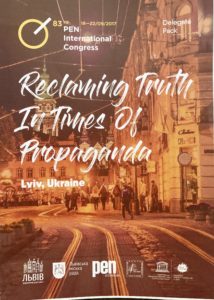
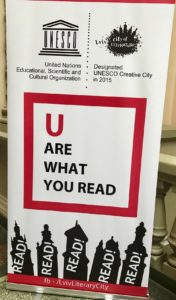
At its annual gathering PEN hosted more than 200 writers, editors, staff and visitors from 69 PEN centers around the world in the historic city of Lviv, the Cultural Capital of Ukraine and a UNESCO World City of Literature. Straddling the center of Europe, on the fault lines between East and West, Lviv changed its name and governing domain eight times between 1914 and 1944, passing from the Austro-Hungarian Empire to Russia, back to Austria, Ukraine, Poland, Soviet Union, Germany then back to the Soviet Union and now finally in the Ukraine.
The path of European history cuts through the city and can be seen in architecture, culture and conversation. Though writers celebrated literature in the western Lviv, fighting was still underway in eastern Ukraine and the Crimea. PEN’s Russian center didn’t attend the Congress at the same time a new PEN St. Petersburg center was elected. Other new centers joining PEN’s network included Cuba, the Gambia and South India.
In times of war, the first casualty is truth, noted PEN’s report “Freedom of Expression in Post-Euromaidan Ukraine: External Aggressions, Internal Challenges.” The report and the Congress addressed the aggressive role of propaganda in conflict. In Ukraine, in Russia and worldwide there has been a proliferation of false narratives.
PEN’s report on Ukraine noted: “Despite significant improvements, democracy in Ukraine remains ‘a work in progress’ and, among other things, severe challenges to the enjoyment of the right to free expression remain. These include the use of the media to foster political interests and agendas, delays in reforming state-owned media; and intimidation and attacks on journalists followed by impunity for the perpetrators. On the other hand, public criticism is growing, albeit slowly, including demands for more transparent and unbiased journalism.”
In Russia authorities are taking increasingly extreme legal and policy measures against freedom of expression, according to a PEN/Free Word Association report “Russia’s Strident Stifling of Free Speech.”
No writers are in prison in Ukraine, but in the Crimea, which Russia annexed in 2014, filmmaker Oleg Sentsov, an opponent of annexation, was arrested and is now serving a 20-year sentence inside a Russian prison on terrorism charges he denies. At PEN’s Assembly, delegates remembered Pavel Sheremet with an Empty Chair. A Belarusian-born Russian journalist and free speech advocate, Sheremet wrote for an independent news website and hosted a radio show where he reported and commented on political developments in Ukraine, Russia and Belarus. He died in a car bomb explosion in Kiev July, 2016. Shortly before he was assassinated, he’d written about corruption among law enforcement in Belarus, Ukraine and propagandists in Russia. His murder remains unsolved.
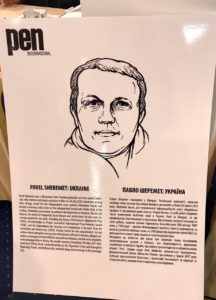
Resolutions at the Congress also addressed writers imprisoned in Turkey, China, Vietnam, Kazakhstan, and Eritrea and killings in Mexico, Russia, Venezuela, Bangladesh and India. Concerns about increasing censorship in Hungary, Poland, India, Turkey, and Spain were acted on as was the restriction of linguistic rights for Kurdish writers in Turkey, Hungarians in Ukraine and Uyghurs in China.
Expressing concern about the abuse of Interpol’s Red Notice system by some member states “in order to repress freedom of expression or to persecute members of political opposition beyond their borders”, PEN called on the Council of Europe “to refrain from carrying out arrests…when they have serious concerns that the notice in question could be abusive.”
PEN expanded Article 3 of its Charter for the first time since the document’s inception over 90 years ago. The Assembly voted new language which would include a wider mandate, reaching beyond just opposing hatreds of race, class and nations to include by extension gender, religion and other categories of identity. Article 3 of PEN’s Charter, which can be linked to here, now reads: “Members of PEN should at all times use what influence they have in favor of good understanding and mutual respect between nations and people; they pledge themselves to do their utmost to dispel all hatreds and to champion the ideal of one humanity living in peace and equality in one world.”
PEN also passed a Women’s Manifesto noting “the use of culture, religion and tradition as the defense for keeping women silent as well as the way in which violence against women is a form of censorship needs to be both acknowledged and addressed.”
At the Opening Ceremony author of East West Street Philippe Sands, whose grandfather was born in Lviv, narrated the origins of international human rights law and the concepts “crimes against humanity” and “genocide.” These legal frameworks were developed by two lawyers who passed through the very university where the delegates sat. The legal teams prosecuting at the Nuremberg trials after World War II used these frameworks to secure convictions, including the conviction of Hans Frank, Hitler’s lawyer who governed the area around Lviv and sent over 100,000 Jews to concentration camps and death.
“The Foundations of human rights law came from here,” Sands said. “Every individual has rights under international law.” The lawyers Hersch Lauterpacht and Raphael Lemkin studied at the university at different times and never met. One escaped to Austria then England, the other to America. Lauterpacht protected the rights of the individual with the concept he developed of “crimes against humanity” and Lemkin protected the group with the legal construct for “genocide.” Both men were on the legal teams that successfully secured convictions at Nuremberg.
“No organization in the world knows better than PEN the need to protect individuals and to protect others,” Sands concluded.
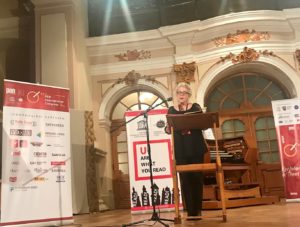
Jennifer Clement, PEN International President
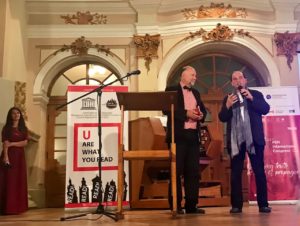
Andrei Kurkov from Ukranian PEN and Carles Torner, Executive Director PEN International
At the closing ceremony author David Patrikarakos focused on the current situation as the 21st century unfolds and addressed “Fact, Fiction and Politics in a Post Truth Age.” He told the story of Vitali, who became a troll for the Russian state working at a Troll farm. “When Vitali went to the Troll farm, he had enlisted in the Russian Army; he just didn’t wear a uniform. He and others became their own army with a virtual information war, and it is effective,” said Patrikarakos.
As an unemployed journalist, Vitali developed propaganda, rewriting reports, doctoring news accounts to enhance Russia’s position then distributed these on social media, along with fake news, fake pictures and memes to a wide audience, all relating to Russia’s assault on the Crimea. According to Patrikarakos (Nuclear Iran: The Birth of an Atomic State), who has also written for the New York Times, Financial Times, Guardian, and Wall Street Journal, the Russian state spent $250 million to sow discord in its battle for Crimea.
In the Troll farm where Vitali and other journalists worked, the first floor focused on distorting news reports and circulating them. On the second floor people worked through social media, posting memes and making up ads; on the third floor bloggers wrote about how life was better in Russian and bad for Russians in the Ukraine and on the fourth floor, people posted comments on other sites.
According to Patrikarakos and his sources, there was a bag of sim cards to request new accounts, and people were encouraged to make the accounts in the names of females because women were more likely to be believed. “The first goal was to shore up and get true believers, to give a narrative and sow as much confusion on reality as possible,” Patrikarakos said.
After three months Vitali told his boss he wanted to quit. He wrote an expose of the Troll farm. When it came out, he received threats such as “Don’t you know you can get punched in the face.”
“As I went through towns of Eastern Ukraine, content had seeped into walls,” said Patrikarakos. “In Eastern Ukraine, Putin’s nervous system is on display. There is belief in fake news—that Ukrainians want to kill Russian speakers. Social media is supposed to connect us but it has also shattered unity and divided people; it sets people at loggerheads. The news that young people get depends on who they follow. We all follow who we like, and so prejudice is reaffirmed. Facts are less important than narratives. The new word in 2016 from the Oxford dictionary was ‘post-truth’ which is finding linguistic footing. The goal of many is not to trust truth but to subvert truth,” he concluded.
What can we do to counter this trend? Patrikarakos advised:
- Go out of your way to see people who don’t think like you.
- Go directly to the source of information and go to the news.
- Read those you don’t agree with.
- Read books. (Patrikarakos’ new book is More Than 140 Characters)
- Mistrust the mob.
- Beware of Click bait.
- Click off.